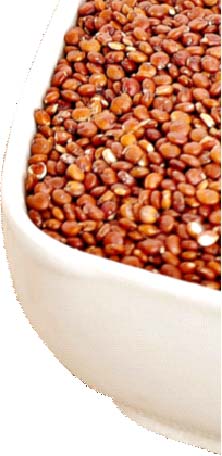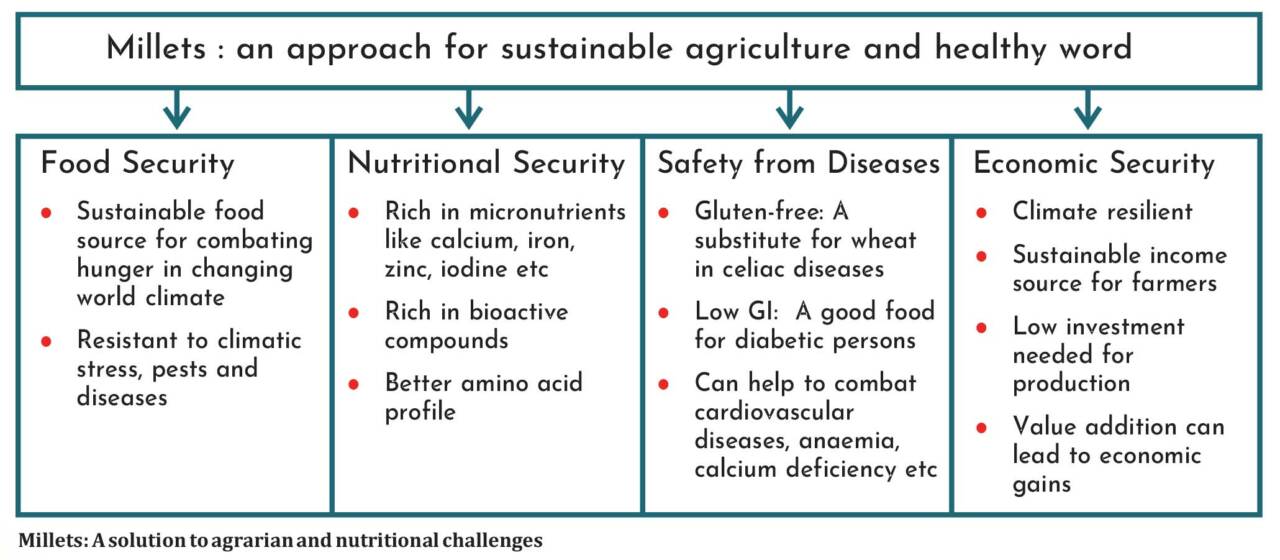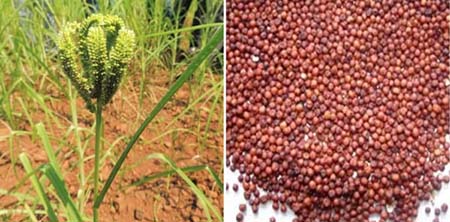Urging the world to focus on the overall advantages of growing and consuming the climate-resilient crop ‘Millet’, as the crop offers hassle-free production and great health benefits to its consumers.
The United Nations (UN) has declared 2023 as ‘the international year of millets’ and has called all stakeholders to provide support to draw policy attention to the nutritional and health benefits of millet consumption, and their suitability for cultivation under adverse and changing climatic conditions. Millets have the potential to help achieve the sustainable development goals (SDGs)—mainly SDG 2 (Zero Hunger), SDG3 (Good Health and Well-being), SDG 12 (Sustainable Consumption and Production), and SDG 13 (Climate Action). Growing millet has many advantages: Being a rain-fed crop with minimal use of fertilisers; no pesticide as they are less vulnerable to insect attack; seeds of millet can be stored for years making it advantageous in drought-prone areas.
According to The International Crop Research Institute for the Semi-Arid Tropics (ICRISAT), more than 90 million people in Africa and Asia depend on millets for their diet. Although the global millet consumption has declined at a rate of 9 percent, the Millet Market forecast for 2022-27 shows promising trends. India dominates the global production at 41 percent, whereas the consumption has been receding over the years. On the other hand, Africa has become the largest consumer of millets at 40 per cent.

Millets are multipurpose: They consume 70 per cent less water than rice; grow in half the time of wheat; and require 40 percent less energy in processing. They are one-stop solution in the wake of climate change, water scarcity, and drought conditions, with high nutritive value to provide sustainable food security (fig 1). Millets are an excellent source of antioxidants and help enhance capability of probiotics with potential health benefits. They play a role in body immune system, a solution to tackle childhood undernutrition and iron deficiency anaemia. Evidence indicates higher nutritive value of millets as compared to other cereal crops.
Diversifying crop production by including more coarse cereals like millets can build food supply, reduce Green House Gas (GHG) emissions, and enhance climate resilience without compromising on nutritive value. A quantitative assessment of altering monsoon cereal production in India, found millets as a viable option for food security and environmental resilience. The economic factor is crucial when it comes to crop choice by farmers and likely plays a role in the historical shift towards cultivating rice and wheat. However, with governments setting minimum support price (MSP) and public distribution system (PDS) under the National Food Security Programmes skews the production in favour of wheat and paddy, and does not offer an incentive for farmers to produce other items such as pulses. Being water-intensive crops, this further burdens the water table.
A large majority of the consumers in India and other countries prefer consuming paddy because of the ease of cooking and also because of their habits. However, it is to be noted that millets have a short shelf life depending on humidity, temperature, and small market size. This calls for more awareness creation drives on the nutritive values and setting up better storage facilities for the crop for increasing its longevity. The states of Karnataka and Odisha set an example by promoting millets and including it in the mid-day meal for schools and distributing them in Anganwadis to combat malnutrition and the Public Distribution System (PDS). Even though millets have been traditionally consumed in past decades, showing improved micronutrient intake and reduced Anemia prevalence in women, of late, barriers of cost, taste, perception, and availability have led to decline in consumption of millet.

Millets can thrive at relatively high temperatures (thermophilic) and reproduce in limited water supply (xerophilic). A review indicates the positive effect of millet cultivation in the reduction of stress on environmental resources, especially in regions affected by climate change. Looking at the water security, millets require almost six times less water for growth (20 com) as compared to rice that requires average rainfall of 120-140 cm. The maturation time for certain millets is 45-70 days, half to that of rice (120-140 days). Being a C4[1] group of cereals, millets convert more carbon dioxide to oxygen, contributing in mitigating climate change. Millets can endure extremely high temperatures to drought to salinity making it a climate resilient crop.
There is ample evidence on nutritive value of millets being a good source of energy, carbohydrates, fats, proteins, soluble and insoluble fibre, anti-oxidants, iron, zinc, and vitamins and can help eliminate micro nutrient deficiency for India and other developing nations. It helps lower cholesterol, as it is rich in poly-unsaturated fatty acids and omega-3 fatty acids. A white paper on ‘Mainstreaming Millets for Nutrition Security’ in India launched in 2021 provides a detailed framework for strengthening the entire value chain by addressing the gaps and calls for replicating scalable models across states for millet promotion in the country. It is time to unleash the potential of millets by creating awareness of the nutritional values to encourage a shift in consumer choices.




















Comments